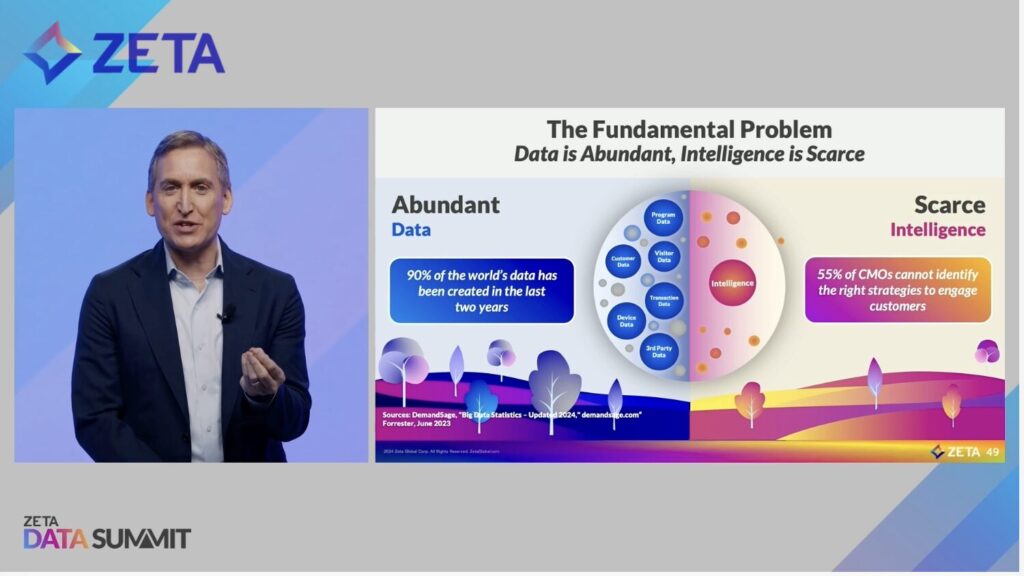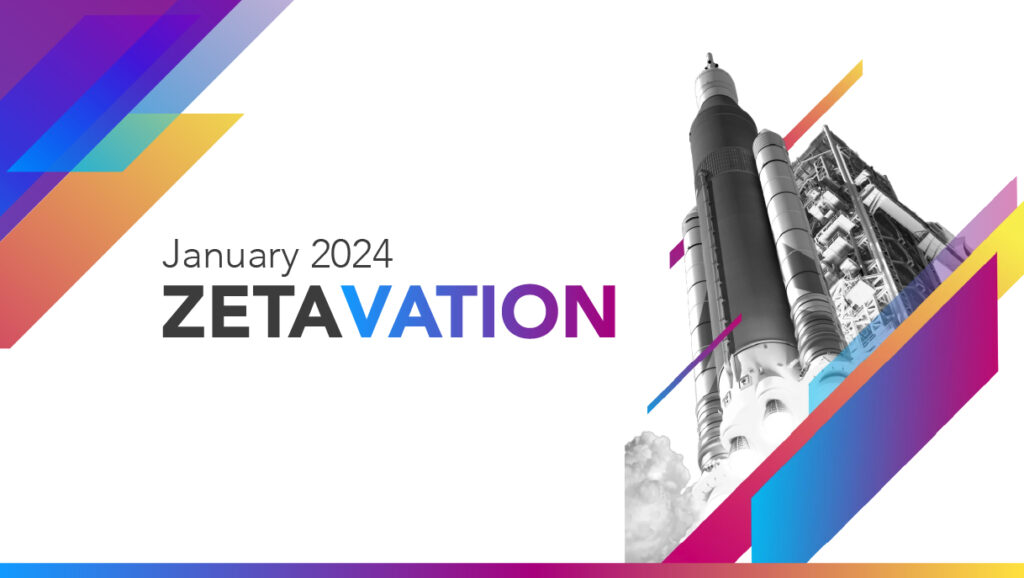
6 Marketing Predictions for 2025
As we look to the year ahead, marketers are poised to navigate one of the most transformative periods in recent history. With generative AI moving from conceptual promise to an actionable cornerstone, 2025 is shaping up to be a pivotal year for innovation, personalization, and growth.
To prepare for the year ahead, we’ve gathered insights from senior executives at Zeta, who share six predictions shaping the marketing landscape in 2025. Drawing from their expertise working with leading global brands, these predictions spotlight the trends, challenges, and opportunities that will define success in the coming year.
Without further delay, let’s dive into the six key marketing trends for 2025.
Generative AI Will Become a Central Force in Marketing
“GenAI is underhyped. It has gone from science fiction to boardroom and in 2025, it has to be actionable. this is the time to invest, this is the time to lead,” advises Steven Gerber, President and COO at Zeta.
“Throughout 2024, Generative AI moved from hype to practicality, creating transformative opportunities for marketers,” says David A. Steinberg, Co-founder and CEO at Zeta. “In 2025, it will become integral to marketing strategies, driving efficiency, and allowing brands to deliver personalized, actionable experiences.”
To win in the coming year, marketers need to move quickly to remain competitive, as companies embracing genAI are outpacing their peers.
But it’s not as simple as integrating basic AI functions into your processes. Roman Gun, VP of Product at Zeta, suggests that genAI will evolve beyond operational support to “become its own channel,” enabling brands to engage directly through AI-driven interactions. This transition will redefine consumer engagement, making AI a channel where preferences and needs dictate interactions in real time.
Every Customer Experience Will be Personal
Personalization has been a key trend, prediction, and frankly, requirement, for many years now. But it’s now at a crossroads; brands who can’t figure out true personalization will be phased out. Consumers—especially younger generations—are incredibly discerning, and with so much competition in many industries, the brands who can get it right will win.
On the technology side, personalized marketing will achieve new levels of specificity in 2025, driven by advancements in AI and the effective use of first-party data. Neej Gore, Chief Data Officer at Zeta, emphasizes the importance of “The 3 P’s: personalization, productivity, and prescience.” He adds, “Personalization needs to become personal for the first time ever. There’s an amazing tailwind with the convergence of ad tech and martech to take advantage of.”
Bryan Seltzer, GM of ZX agrees: “We’ve been talking about it for years in the industry and I think we’re finally at a place where harnessing first-party data is going to allow for advanced personalization across all spectrums of the funnel.”
These strategies help brands cut through digital noise, tailoring experiences that are relevant and meaningful. And again, this isn’t optional. Brands must resolve their data issues to enable true personalization at scale.
Workforces Will Transform with AI Integration
As generative AI evolves, businesses must reimagine their operational approaches. It’s not just about the AI opportunities, but adoption, advises Matthew Mobley, President of CRM at Zeta.
Chris Monberg, CTO and Head of Product at Zeta, argues that AI’s impact requires changes in the workforce. “In 2025, business leaders and marketers should be thinking about transforming their companies. It starts with each individual at the organization. As generative AI has changed the way we think about marketing to individuals and the way we think about running our programs, we need to be prepared to change the workforce, accelerating insight to action every day,” he says.
Leaders must empower employees to leverage AI tools, ensuring that every level of the organization can benefit from these advancements. But it starts with having AI policies, investing in AI-powered marketing tools, and building processes to use AI to its potential.
Data Strategies and Unified Customer Views Will be Paramount
A consolidated 360-degree customer view is essential for effective engagement, this isn’t new. What’s changed is integration and unification will be the top priority for organizations.
Bashir Eghbali, EVP of Data Cloud Acceleration at Zeta, notes the need to integrate customer interactions across channels to enhance personalization. “You need to consolidate your view of customers and prospects into a 360 view across all the channels so you can see what customers are doing within your walls—and outside—to better market to them and create a personalized experience that closes the gap between them and your brand,” he says.
Similarly, Harrison Davies, President of Media Activation at Zeta, underscores the necessity of a robust data strategy, given the evolving data landscape: “Data and first-party targeting and measurement is becoming more important even as the framework and the infrastructure on which that relies is becoming more uncertain. So it’s critical for marketers to really understand both how to leverage their data and also how to organize that data so that it’s most effective in market.”
Growth Will be the Focus of Marketing Orgs
One of the most important organizational changes we expect in 2025 is the continuation of the transition of the role of the CMO. Particularly, marketing leaders are becoming Chief Growth Officers instead of primarily being brand stewards.
Gerber argues that “marketing has become too hard. And the root cause of this problem is that while data is abundant, intelligence is scarce.” He further notes that genAI is accelerating the shift in the CMO role because of the promise of greater personalization, innovation, and digital marketing success.
Part of this shift in focus to growth lies in ensuring full-funnel strategies and accurately reporting on attribution. Catherine Pitman, SVP of Product Innovation at Zeta, advocates for “condensing strategy, reducing waste, and ensuring that measurement is tied to action.”
Marketers must not only track results but ensure that insights lead to concrete, profitable actions to drive ROI. The C-suite is now leaning on the CMO to ensure strategic and predictable growth of the company.
Brands Will Become More Human
The rise of genAI and focus on growth are just one side of the coin. On the other hand, 2025 will be the year that brands figure out how to be more human.
“A lot of the more manual and operational pieces will be eventually taken care of by generative AI. Brands should be thinking about how they can strategically differentiate themselves by leveraging intelligence,” says Winnie Shen, EVP of the Data Cloud Applications Group at Zeta.
The challenge is to figure out how to operationalize and standardize, without losing that personal touch.
“There’s an extraordinary opportunity…to take AI and commercialize it at a scale that was unimaginable before,” says John Sculley, Co-founder and Vice Chairman of Zeta.
And this means more space for creativity, social impact, and doing work for good.
How Zeta Can Help You Succeed in 2025 and Beyond
As 2025 ushers in transformative opportunities, it also presents unique challenges. From operationalizing generative AI, achieving true personalization, and unifying customer data to redefining the role of marketing leaders, staying competitive requires agility and innovation.
Zeta Marketing Platform is purpose-built to help you navigate these shifts. With a cloud-based system powered by proprietary data, advanced AI, and intelligent automation, we deliver the tools you need to acquire, engage, and retain customers at scale.
Let us help you make 2025 your most successful year yet. Learn more about how Zeta can be your partner in growth.
Want to see Zeta in action?




